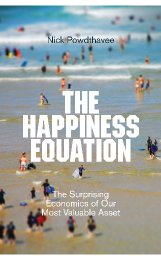The Happiness Equation
The surprising Economics of Our Most Valuable Asset
Authors:
Nick Powdthavee
Retail Price (Softback):
Retail Price (Ebook):
ISBN: 9781848311664
First Published: 2010
Description:
What it says on the cover
Why is marraige worth £200,000 a year?
Why will having children make you unhappy?
Why does happiness from winning the lottery take two years to arrive?
Why does time heal the pain of divorce or the death of a loved one - but not unemployment?
Everybody wants to be happy. But how much happiness - precisely - will each life choice bring? Should I get married? Am I really going to feel happy about the career that I picked? How can we decide not only which choice is better for us, but how much better it is for us.
The result of new, unique research, The Happiness Equation brings to a general readership for the first time the new science of happiness economics.
It describes how we can measure emotional reactions to different life experiences and presents them in ways to which we can relate. How , for instance, monetary values can be put on things that can't be bought or sold in the market place - such as marraige, friendship, even death - so that we can objectively rank them in order of preference. It also explains why some things matter more to our happiness than others (eg why seeing friends is worth more than a Ferrari) while others are worth almost nothing (like sunny weather).
Nick Powdthavee - whose work on happiness has been discussed on both the Undercover Economist and Freakonomics blogs - brings cutting-edge research on how we value our happiness to a general audience, with a style that wears the learning lightly and is a joy to read.
Icon Books

























Your Opinions and Comments
Well researched with plenty of references, it is easy to read with examples that most readers will readily relate to, but it is not a book to skim, so I'll take my time as each page challenges me to reflect about my own values.
It comes at an appropriate time when the UK Coaltion Government is making great changes to the public sector services. I can see many politicians looking at the changes (mainly cuts) and seeing if they can detect the effect on the happiness of various sectors of the population.
We see on our streets how angry many students at university and at school feel. Although the politicians say it it much more progressive in money terms for many, how come such protests are taking place - it has clearly had an effect on student unhappiness!
More later on a book that looks so far as it will make a great contribution to the economics of politics.